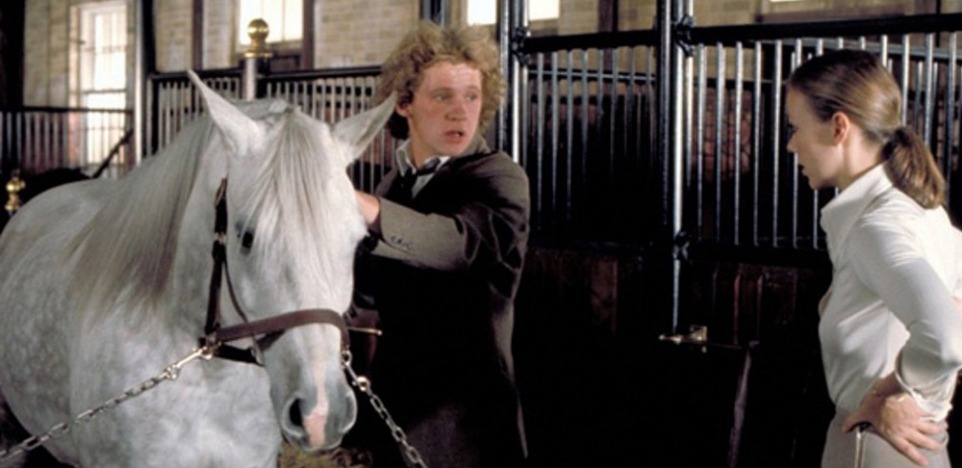Martin Dysart (Richard Burton), a doctor in an English psychiatric hospital, is called upon by a woman magistrate (Eileen Atikins) to take on young Alan Strang (Peter Firth) as a patient. He is a stableboy who has blinded six horses by plunging a steel spike into their eyes. She believes Dysart can do Strang some good and also uncover the reasons behind the boy's mad act of violence.
The psychiatrist and the youth play cat and mouse with each other for a while. Dysart discovers the psychic damage done to Alan by his puritanical mother (Joan Plowright), who is obsessed with religious fundamentalism, and his stern authoritarian father (Colin Blakely), who is sexually frustrated. He also learned about Alan's friendship with a coquettish girl (Jenny Agutter) who works at Harry Dalton's (Harry Andrews) stables. Through hypnotism and abreaction, the boy reveals the incidents leading up to and including his violent act. Alan has made horses into gods and love objects — surely, according to moral societal mores, evidence of his sexual and religious confusion. But is it?
As the patient and his doctor draw closer to their respective truths, we are caught up in the revelation that Alan's capacity for ecstasy is something Dysart is incapable of achieving. All his life the psychiatrist has longed for a religious connection, the experience of something beyond the exigencies of everyday life. To compensate for his loveless and childless marriage, Dysart has studied Greek culture and even collected relicts from that primitive civilization. But all this seems pale and cheap in comparison to Alan's genuine passion.
The crux of the drama is Dysart's realization that the boy, sick as he really is, has experienced the joy of soulful transport beyond anything he has ever felt. If he heals Alan, making him into a normal citizen, the cure may well be at he expense of that passion. In a compelling conversation with the magistrate, Dysart exclaims:
Look…to go through life and call it yours — your life — you first have to get through your own pain. Pain that's unique to you…All right, he's sick. He's full of misery and fear…But that boy has known a passion more ferocious than I have felt in any second of my life. And let me tell you something. I envy it.
As we leave Dysart, he has thrown his work and his very existence into question. And because of the authenticity of his soul-searching, we find ourselves engaged in a similar process.
French playright Antonin Artaud proposed that one of the highest functions of drama is to put itself whenever possible "in communication with pure forces and bring to birth images of energy in the unconscious." He wanted to create occasions "in which violent physical images crush and hypnotize the sensibility of the spectator seized by the theatre." Now a feature film, it is a compelling psychiatric detective story, a multileveled parable on the human condition, and an exercise in "holy theatre."
As a psychiatric detective story, Equus forces us to reexamine our understanding of madness and sanity. Screenwriter Shaffer would have us see that labeling as mad those impulses which cannot be tailored to our traditional normal might under examination be considered undesirable.
Equus is also an illuminating parable about the human condition, giving voice and word to the inward hunger we have for some knid of religious experience. Shaffer seems to agree with Theodore Roszak who believes that "we are religious beings right down to our very core and there is no wholeness, sanity, for us until we make spiritual need even more fundamental than all others."
And thirdly, Equus is an exercise in what Peter Brook called "holy theater" — drama as exploration, revelation, and shared meaning. The impact and value of ths work really consists in its cataclysmic effect upon us. Equus opens religious doors, sets in motion the process of our self-awareness, and provides us with a set of profound and eternal questions to ponder together. It makes us look into ourselves — even into those parts of our psyche and soul where we haven't dared to travel for some time. That result is the trump card of all extraordinary drama.
Director Sidney Lumet (Network, Dog Day Afternoon, Serpico, Murder on the Orient Express) has brought this riveting play to the screen with all of its ideational dynamite intact. The film was shot on location in Toronto. All the performances are top-notch. Those unfamiliar with the drama should be aware that there is some frontal nudity as well as one very violent scene. These touches are dramatically justifiable and in context with the moral tone of the play as a whole. Those who saw Equus in the theater may find the real horses used in the film less majestic and mysterious than the totemic masks of horse heads won by male actors in the stage version. However, whatever is lost in open-endedness is gained in a vivid sense of equine presence.
